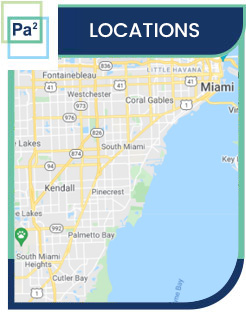Which Allergies Are Treated by an Allergist?
Allergists treat a wide range of allergies with a focus on identifying triggers and creating personalized care plans. This includes environmental allergies like pollen, dust mites, mold, and pet dander, along with food allergies, medication reactions, insect stings, and chronic skin allergies. For specialized, patient-focused allergy care, schedule a visit with Dr. Carlos Piniella, MD at Piniella Asthma + Allergy, where comprehensive testing and long-term management are central to care. Contact us for more information or schedule an appointment online! We have convenient locations to serve you in Coral Gables FL and Palmetto Bay FL.


Table of Contents:
Can other conditions look like allergies?
What triggers my allergies?
What can I do at home or in my life to avoid getting allergic reactions?
Will I have to take medicine?
Do people outgrow allergies?
Allergies can appear as symptoms of other illnesses or medical conditions depending on the reaction. Allergic reactions to particles in the air can often manifest themselves as sneezing, nasal congestion, or a runny nose. These symptoms can be perceived as symptoms of a cold, sinus infection, or the flu. A deviated septum can also cause symptoms similar to an allergic reaction as it causes a narrowing of the nasal passage, making it difficult to breathe and disrupting the normal flow of the mucus.
Just like we as humans are unique, our allergy triggers are unique to each individual. People who suffer from allergies will have different allergens that cause their immune system to have an allergic reaction and each person’s allergic reaction will be different. Allergies can be triggered by food ingested through the mouth, in extreme cases even food that touches bare skin can cause an allergic reaction. Allergies can also be triggered by allergens coming into contact with exposed skin, allergens in the air that we breathe, or through insect bites. If you think you are suffering from allergies, it is important to see your doctor walk through your symptoms and figure out your triggers. You will need to keep track of what you are eating, touching, and exposed to, and when your symptoms present themselves and disappear to help your doctor pinpoint what could be causing the reaction. If your doctor is not able to determine what is causing your reaction, he or she can recommend you get a full allergy test to narrow in on the allergens you are reacting to.
One of the easiest things you can do at home or in your day-to-day life to avoid allergic reactions is to avoid the allergens you are reacting to. By working with your doctor and determining what is causing your allergic reaction, you can identify the things you need to avoid. In some cases, it is impossible to avoid the allergens your body is fighting so your doctor might prescribe or recommend medication for you to take to help reduce the severity of your reaction. You could also ask your doctor about allergy shots as a form of immunotherapy. This will help your body build up a tolerance to the allergens and over time lessen your reaction and need for medication. In some cases, people no longer need medication or allergy shots at all as they have built up enough of a tolerance that their body no longer reacts to the allergens. In cases of severe reactions, your doctor will recommend you have an epinephrine shot close at hand whenever you are at risk of coming into contact with an allergen that can cause you to go into anaphylactic shock, a severe allergic reaction that is life-threatening. The shot will reduce the symptoms of a severe allergic reaction to allow you time to receive emergency medical treatment.
The need for medicine to treat allergies and control allergic reactions will depend on the individual, the allergens that their immune system reacts to, and the severity of the reactions. Some people only have mild symptoms that disappear on their own quickly, not requiring any type of medical intervention. In other cases, the allergen might be something that the individual is exposed to on a seasonal basis, situational basis, or ongoing basis. For example, in a situational case, allergy medicine might be a good solution as exposure to the allergen is very limited and the reaction can be handled with medication. This can work in the case of someone who is allergic to cats or dogs but doesn’t own one and is not exposed to them on a regular basis. Discussing your treatment options with your allergist is the best course of action as they can recommend if the medicine will work for you or if there are other treatments you can try for your allergen triggers and the reaction.
In some cases, people can outgrow allergies as they age. Kids tend to manage to outgrow their allergies, in some cases before starting kindergarten. The most common allergens that kids outgrow are soy, wheat, eggs, and milk by their mid-teens. Other allergens such as shellfish, tree nuts and fish are less common for kids to outgrow and are usually allergies the kid will carry with them for life. Unfortunately, there is no way to predict who will grow out of allergies, or which allergies a kid will outgrow. Caution needs to be taken when trying to test if an individual, particularly a child, has outgrown an allergy. It is best to work with your doctor to determine if the allergen no longer causes a reaction to ensure that there are no adverse reactions.
If you want to know more about our services, call us or schedule an appointment online! We serve patients from Coral Gables FL, Palmetto Bay FL, Westchester FL, Brownsville FL, Kendall FL, Pinecrest FL, Richmond West FL, and Goulds FL.

Additional Services You May Need
▸ Asthma
▸ Allergy Testing
▸ Food Allergies
▸ Immunotherapy
▸ Patch Testing
▸ Allergy Treatment
▸ Pediatric Asthma Specialist
▸ Pediatric Allergist
▸ Insect Bite Allergy
▸ Drug Allergy
▸ Seasonal Allergies
▸ Skin Allergy

Additional Services You May Need
▸ Asthma
▸ Allergy Testing
▸ Food Allergies
▸ Immunotherapy
▸ Patch Testing
▸ Allergy Treatment
▸ Pediatric Asthma Specialist
▸ Pediatric Allergist
▸ Insect Bite Allergy
▸ Drug Allergy
▸ Seasonal Allergies
▸ Skin Allergy


